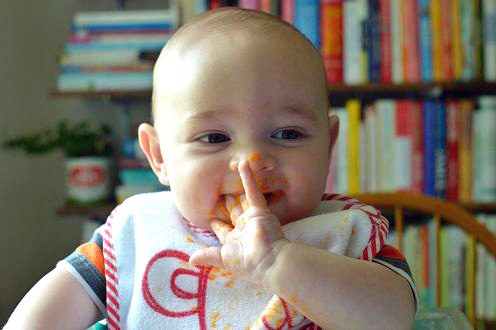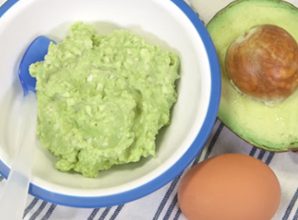I just started feeding my son solid food. He’s a few weeks shy of six months, and while I was planning on waiting until that half-year marker, I could tell he was getting hungry. He sits at the table with my older sons, husband and I every night and stares longingly as we move our fork from plate to mouth and back again. His tiny tongue darts in and out of his mouth, and he tries to swipe everything and anything within his reach. My instincts told me this boy was ready for food.
How to Know if Baby is Ready for Solid Food
The key part of the paragraph above is my use of the word ‘instinct’, because I think it’s a vital component to confidently introducing solid foods to your baby. At Matthew’s four-month check-up with his paediatrician she suggested I start him on rice cereal that weekend. I just knew he wasn’t quite ready for food yet, so I heeded her advice, but chose to do something different. Similarly, not all babies are ready to eat before six months, but I know that mine is. The formal guidelines set out by Health Canada recommend exclusively breast/bottle feeding for the first six months of life. The introduction of solid foods before four months has been linked to obesity, while delaying it beyond six months may lead to a diet deficient in iron and zinc. If you’re still left feeling unsure about when to start feeding solids to your baby, here are a few signs to look for that may indicate your baby is ready to begin eating:
- Your baby has head and neck control and can hold them both still.
- Your baby gives you cues. Do they seem ‘interested’ in eating? Do they try to grab food from your plate or hand?
- Your baby can keep food in their mouth and swallow it.
- Your baby has the ability to let you know they are full by turning their head away from breast or bottle when they’ve had enough.
Which Foods to Start With
Once you’ve decided your baby is ready for food, you need to determine which foods you’re going to start with.
- Rice cereal is typically the first food for most babies, and while you can make a homemade version, experience has taught me that a quality store-bought brand is much easier to use, and in some cases, eat.
- Meat is now at the top of the first foods list according to Health Canada and fruits and veggies should also make up a large component of your baby’s diet. I chose to start Matthew off with vegetables first, and he’s been enthusiastically devouring sweet potatoes for lunch. As he hits the six-month marker, I’ll be adding lentils, meat, and cereal to his repertoire.
- Remember, only give your baby one new food at a time, and wait 2-4 days before introducing another food. After each new addition, watch for allergic reactions to occur, such as a rash, diarrhea, and/or vomiting.
In the coming weeks/months we’ll talk about how rewarding, economical, and easy is it to make homemade baby food, and I’ll share recipes for simple purees and other first foods for babies. Are you currently feeding a baby? Do you make your own food? Let’s chat!
Tagged under: baby,Baby food,first foods,baby food tips,weaning,rice cereal,pablum
Category: toddler-food






